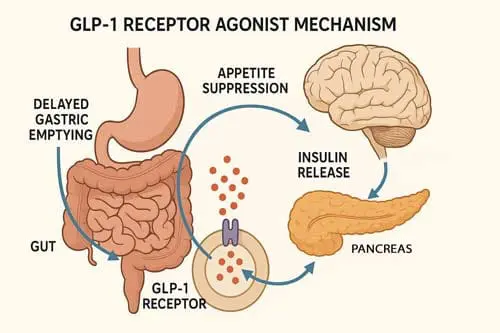Outpatient Sedation Basics for Patients on GLP-1 Medications: What Non-Anesthesiologists Need to Know
With more patients taking GLP-1 medications like Ozempic, Wegovy, or Trulicity for diabetes and weight loss, it's important for all providers—dentists, proceduralists, and specialists who give sedation outside of operating rooms—to understand how these drugs can affect their procedures.pubmed.ncbi.nlm.nih+2
What are GLP-1 Medications?
GLP-1 receptor agonists slow how quickly food leaves the stomach (gastric emptying). Examples include:
• Semaglutide (Ozempic, Wegovy)
• Dulaglutide (Trulicity)
• Liraglutide (Victoza, Saxenda)
These medications help with blood sugar control and weight reduction, but their effect on the stomach is key for sedation safety.asahq+1

Why does this matter for sedation?
GLP-1 medications can significantly delay gastric emptying. This means your stomach may not be empty—even after a standard fasting period. The primary risk during sedation or anesthesia is aspiration: stomach contents entering the lungs if vomiting or regurgitation occurs, which can lead to serious complications like pneumonia or respiratory distress.
Sedation Concerns and Recommendations
U.S. and international guidelines are rapidly evolving to address the risks associated with GLP-1 use.
Recent multisociety practice guidelines have offered more clarity for clinicians who provide sedation outside the operating room—including dentists, endoscopists, and proceduralists—when treating patients on GLP-1 receptor agonists (GLP-1 RAs) like Semaglutide, Ozempic, or Wegovy.sciencedirect
Key Recommendations:
- Shared Decision-Making:
- Management should involve the patient and all relevant care teams (procedural, anesthesia, prescribing), considering metabolic needs and individual risk factors.
- Assess Risk Factors for Delayed Gastric Emptying:
- Dose escalation phase.
- High doses of GLP-1RA
- Weekly dosing (vs. daily)
- Presence of GI symptoms (nausea, vomiting, abdominal pain, constipation).
- Coexisting medical conditions affecting gastric emptying (gastroparesis, Parkinson’s, bowel dysmotility).
- Preoperative Management:
- GLP-1RAs can be continued in patients without elevated risk.
- If elevated risk is present, discontinuation should be considered, weighing risks of metabolic decompensation.
- Bridging therapies may be considered but can be costly and risky.
- Avoid weight/obesity bias in deciding who should discontinue GLP-1RA therapy.
- Recommended discontinuation periods (if indicated): hold daily formulations on the day of surgery; hold weekly formulations for one week prior to surgery.
- Always reassess for symptoms of delayed gastric emptying on the day of procedure.
- Minimizing Aspiration Risk:
- Use preoperative liquid diet (at least 24 hours) in patients with concern for delayed gastric emptying.
- Use point-of-care gastric ultrasound when feasible to assess for retained gastric contents.
- Consider rapid sequence induction of anesthesia for intubation if retained gastric contents are present, using shared decision-making to weigh procedure cancellation vs. risk reduction
Practical Approach
• Prioritize safe continuation of scheduled procedures for patients on GLP-1RAs, applying similar risk management as for other patients with gastroparesis.
• Guidelines should be updated as new antiobesity drugs and more data become available.
Communication with Patients
• Always ask specifically about diabetes and weight-loss injectables, and explain why you need to know.
• Clearly instruct when to pause their medication and the importance of reporting GI symptoms before sedation.
• Make sure they understand the aspiration risk and that you may need to reschedule or adjust the plan for safety.

Take Home For non-anesthesiologists providing sedation:
• Screen for GLP-1 use and symptoms.
• Follow the updated guidance for pausing medication.
• Treat patients as higher risk for aspiration if symptoms, missed hold, or urgent procedures.
• When unsure, a more conservative approach—lighter sedation, delay, or referral—is safest.
Citations:
• Multisociety clinical practice guidance for safe use of GLP-1 RAs. sciencedirect
• PubMed review: Implications of GLP-1 Agonists on Office-Based Sedation and General Anesthesia pubmed.ncbi.nlm.nih
• ASA Consensus-Based Guidance on Preoperative Management of Patients on GLP-1s pubmed.ncbi.nlm.nih